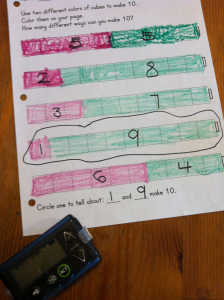Diabetes vs. My Teaching Job
 “Beep beep beep.” I recognize my insulin pump’s low blood sugar alarm right away. But Eva looks up from her homework, inquisitively.
“Beep beep beep.” I recognize my insulin pump’s low blood sugar alarm right away. But Eva looks up from her homework, inquisitively.
“What’s that?”
I just started tutoring Eva today. She is in second grade, she’s struggling in math, and that’s about all I know about her. What she knows about me is similarly limited.
As an early childhood educator, I’ve had to explain how diabetes affects my life to hundreds of children. But I prefer to wait until they’re more familiar with me, before launching into this topic.
Through eight years of teaching, I’ve learned that discussing my health with colleagues and students can be a delicate process. I remember one principal telling me to hide my condition from students. I explained that this would make it difficult to maintain my health, and assured her that I didn’t mind talking about it.
“No,” she replied. “These kids are from troubled homes. They see needles, and they think you’re doing drugs. How am I going to explain that to parents?”
She shook her head. “You can’t be a teacher with a disease that gets in the way.”
I stopped trying to explain after that. Instead, I started looking for work elsewhere. Despite her misguided theories, I knew that:
- doing my job did not need to conflict with staying healthy
- hiding my “drug paraphernalia” was challenging and unnecessary
- parents would not object to positive diabetes management
- given the proper information, students could distinguish between narcotics and medical treatments
Balancing my career while still maintaining my health has become a focus for me since then. I’ve found better ways to help the people around me feel comfortable with diabetes. The trick is to be positive, informative, and matter-of-fact. I’ve been fairly successful in helping both young and older people acclimate to my blood tests, medical devices, and snacks.
I’m caught off guard today though. Eva has known me for only 20 minutes, and I’m not sure how she’ll respond. Does she know anyone who’s dependent on medical equipment? Has she ever heard of diabetes? Has she had a negative experience with blood tests or health conditions?
“It’s my medicine machine,” I tell her, as brightly as I can. I pull it out of my pocket, showing it to her as I silence the alarm.
“Why did it make that noise?”
“It’s telling me I need some medicine.” I fish the tube of glucose tablets out of my purse, and show it to her. I pop one tablet into my mouth.
“Oh.” Satisfied with the explanation, she turns back to her work.
~~~~~~~~~~~~~~~~~~~~~~~~~~~~~~~~~~~~~~~~~~~~~~~~~~
Several days later, Eva smiles when she hears the pump alarm. “It’s your machine again,” she announces.
“Yes,” I say, glancing down at it. “It’s telling me to take a blood test. Have you ever taken a blood test?”
“Yeah,” she responds. “At the doctor’s office.”
“I’m going to do it now. You can watch if you want.” I’m finished in 30 seconds, faster than she expected.
“Does it hurt?” She wants to know.
“Not too much,” I say. “It’s just a little prick.”
We return to the task of snapping together cubes and counting sums of ten. I’ve successfully conveyed to her that diabetes isn’t something to feel distressed or uncomfortable about. And she knows that if she thinks of more questions, my answers will be positive, informative, and matter-of-fact.
Please share! I’d love to hear your thoughts and experiences! How does diabetes affect your career? What has been most challenging? What is your approach in discussing your condition with colleagues or clients?
Please write a comment below.